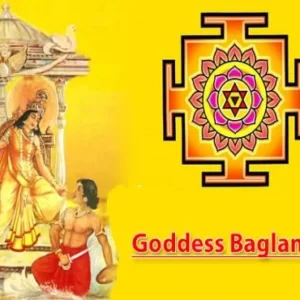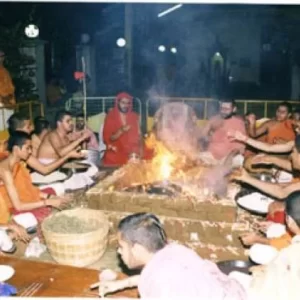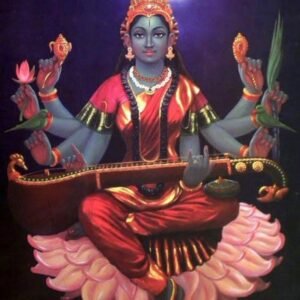-
Sarva Dukha Nivarana Sadhana (Uchita Seva – Free for all)
Sarva Dukha Nivarana Sadhana is a spiritual practice aimed at alleviating all types of suffering through specific rituals dedicated to appeasing the nine planets (Navagrahas), Lord Shiva and Lord Hanuman.
Everyone has some or other problems in life, some which you know the problems, some of them you dont even know that there is a problem. Some of them you can express and some of them you dont know how to express.
To benefit all people to overcome all such challenges and problems in our daily lives, Sri Parvathi Seva Shakti Peetham is organising Uchita Sarva Dukha Nivarana Sadhana – Free of cost for all.
SARVE JANA SUKHINO BHAVANTHUCome alone or bring anyone with you…. ALL ARE WELCOME.
Here’s an overview of how the rituals of Navagraha Puja, Navagraha Homam, Rudrabhishekam, and Hanuman Chalisa Chanting are performed to seek blessings and remove obstacles
Day : Saturday
Time : 5.00 PM to 7.00 PM
Cost : FREE PARTICIPATION
₹0.00 -
One-Time Subscription – Pay What You Like
Support our work with a one-time contribution of your choice. Every bit helps and is truly appreciated.
-
Kethu ( South Node)
Graham Dhanyam : Ulavalu (Horse gram)
Japa Sankhya : 7000
Duration : 7 hrs
Kethu is the second shadow planet of the solar system. It is believed to be the second half of Rahu. Hence both of them move in a fixed manner at a fixed distance from each other. Ketu is very important it mainly signifies spirituality, detachment, foreign settlement, karma, liberation, retirement, etc. As per many astrological scriptures, a lot depends on the position of Ketu in the life of an individual. It is also related to mysteries and sudden or unexpected gains. One must carefully analyze the chart and perform the necessary remedies if needed.
₹3,516.00 -
Navagraha Puja Chandi Homam ( On a Specific Day)
Navagraha puja,Kalasa Stapana Puja and Chandi Homam will be performed for family members. Family members can participate in the homam. They need to get special clothing for participation. Please contact Kesava Shrama Garu for more information.
The Chandi Homam is done to get blessing from Goddess Chandika Devi. This is one of the most precious and powerful homam one can perform for destroys all kinds of problems and to bring a Grand success in Life.
Date can be fixed as per one’s janma nakshatra, the yoga and thithi of that date. Fridays, Ashtami, Navami, Amavasya, Poornima and Chatrudas thithis are suitable for performing this homam.
₹18,000.00 -
Bagalamukhi Pashupata Homam
Bagalamukhi Homam
Bagalamukhi Devi is the eighth powerful goddess of the ten Mahavidyas. Bagalamukhi Homam and Mantra evoke innumerable advantages for all-round protection, prosperity stability, and offers protection against diseases, chronic problems, and accidents. Regular Japa of the Bagalamukhi Mantra is said to paralyze the ego and actions of a person who tries to harm us.
₹18,000.00 -
Runavimochana Pasupata Homam
Runavimochana Pasupata Homam is a powerful Vedic ritual aimed at freeing an individual from Runam (debts)—not only material or financial debts but also ancestral, karmic, and emotional burdens. This sacred fire ritual invokes Lord Rudra in his fierce and benevolent aspect as Pasupata, the one who liberates beings from bondage and negative karmas.
Conducted according to ancient Vedic traditions, this Homam is specifically designed for those struggling with financial instability, chronic debt, or invisible obstacles blocking abundance. It is performed with full faith in divine grace, where prayers, offerings, and mantras work together to purify the karmic imprints and attract wealth and clarity.
₹18,000.00 -
Varahi Devi Homam
🕉 Foreword
Varahi Devi, a powerful manifestation of Goddess Shakti, is one of the Sapta Matrikas (Seven Divine Mothers) and the commander of the army of Goddess Lalita Tripurasundari. She embodies the boar-faced form of Vishnu’s Varaha avatar, signifying divine protection, courage, and fierce justice.
This 1-day Varahi Devi Puja and Homam invokes Her blessings to destroy negativity, remove fear, and provide spiritual and material protection.₹12,500.00 -
SATA CHANDI
📿 What is Sata Chandi?
In the ancient Vedic tradition, Sata Chandi Parayanam refers to the recitation of the Devi Mahatmyam (Durga Saptashati)—a powerful scripture from the Markandeya Purana—once daily for 108 consecutive days, followed by a grand Chandi Homam (Fire Ritual) on the 108th day. This sacred practice is often undertaken with deep devotion, discipline, and spiritual focus.
₹187,983.00 -
Raja Poshaka
Exclusive Spiritual Sponsorships
Elevate Your Spiritual Journey with Shree Parvathi Seva Shakthi Peetham
At Shree Parvathi Seva Shakthi Peetham Charitable Trust, we offer exclusive spiritual sponsorship opportunities that connect you and your family to ancient Vedic traditions while supporting our charitable initiatives. Our premium sponsorship packages provide long-term spiritual benefits with personalized ceremonies on your special occasions.
RAJA POSHAKA | ₹51,002
Sustained Divine Protection
Our Raja Poshaka package offers a comprehensive spiritual sponsorship for families seeking consistent divine blessings and protection through traditional Vedic ceremonies.
This valued package includes:
- Chandi Homam performed every Poornima (full moon) with your family’s intentions
- Mahanyasa Purvaka Rudrabhishekam on every Masasivaratri for your family’s wellbeing
- Annual ceremony on your chosen special day (birthday, anniversary, or any meaningful date)
- 5-year spiritual commitment with yearly participation opportunities for your family
- Flexible scheduling for your personal ceremony
- Spiritual consultation with our priests
- Prasadam from major ceremonies
The Raja Poshaka sponsorship establishes a strong spiritual foundation for your family, attracting divine blessings for protection, harmony, and success.
How to Participate
- Connect with us through our website or by calling 9849379422
- Select your preferred package based on your spiritual aspirations
- Choose your special day for personalized ceremonies
- Complete the spiritual sponsorship through your preferred payment method
- Begin your enhanced spiritual journey with our dedicated support
Your contribution not only secures these exceptional spiritual benefits for your family but also supports our charitable initiatives serving the community.
“Elevate your spiritual practice while contributing to the greater good.”
Payment Information:
Bank Account Number: 42437652958
IFSC: SBIN0021394Contact us today to begin your family’s enhanced spiritual journey.
₹51,001.00 -
MahaRaja Poshaka
Exclusive Spiritual Sponsorships
Elevate Your Spiritual Journey with Shree Parvathi Seva Shakthi Peetham
At Shree Parvathi Seva Shakthi Peetham Charitable Trust, we offer exclusive spiritual sponsorship opportunities that connect you and your family to ancient Vedic traditions while supporting our charitable initiatives. Our premium sponsorship packages provide long-term spiritual benefits with personalized ceremonies on your special occasions.
MAHARAJA POSHAKA | ₹99,999
The Ultimate Divine Connection
Embrace the highest level of spiritual sponsorship with our prestigious Maharaja Poshaka package. This premium offering establishes a profound connection between your family and divine energies through consistent sacred rituals performed by our expert priests.
This exclusive package includes:
- Chandi Homam performed every Poornima (full moon) in your family’s name
- Mahanyasa Purvaka Rudrabhishekam on every Masasivaratri dedicated to your family’s wellbeing
- Special ceremonies on your selected personal day (birthday, anniversary, or any significant date)
- 10-year spiritual commitment with annual participation opportunities for you and your family members
- Priority scheduling for all ceremonies and events
- Personalized spiritual guidance from our experienced priests
- Regular prasadam delivered to your doorstep after major ceremonies
The Maharaja Poshaka sponsorship creates a continuous stream of positive spiritual energies directed toward your family’s prosperity, health, and fulfillment across all aspects of life.
₹99,999.00 -
Rajashyamaladevi Navratri Puja and Homam – Nine Days Subscription
Rajashyamaladevi Navratri Puja and Homam
Origin of Rajashyamaladevi Worship
Rajashyamaladevi is a revered manifestation of the Divine Mother and is associated with creativity, wisdom, and speech. She is a form of Goddess Durga, specifically worshipped during Navratri, the nine-night festival dedicated to the various forms of Shakti (Divine Feminine Energy). The origins of Rajashyamaladevi worship trace back to the Shakta traditions and Tantric practices, where She is venerated as the Goddess of intellect, knowledge, and the arts. The rituals emphasize attaining mastery over communication, music, and harmonious living.
Rajashyamaladevi is considered the epitome of beauty, eloquence, and knowledge, and her worship is deeply rooted in Vedic scriptures and Puranas, particularly the Markandeya Purana and Devi Bhagavatam.
₹6,516.00 -
Rajashyamaladevi Navratri Puja and Homam – One Day Subscription
Rajashyamaladevi Navratri Puja and Homam
Origin of Rajashyamaladevi Worship
Rajashyamaladevi is a revered manifestation of the Divine Mother and is associated with creativity, wisdom, and speech. She is a form of Goddess Durga, specifically worshipped during Navratri, the nine-night festival dedicated to the various forms of Shakti (Divine Feminine Energy). The origins of Rajashyamaladevi worship trace back to the Shakta traditions and Tantric practices, where She is venerated as the Goddess of intellect, knowledge, and the arts. The rituals emphasize attaining mastery over communication, music, and harmonious living.
Rajashyamaladevi is considered the epitome of beauty, eloquence, and knowledge, and her worship is deeply rooted in Vedic scriptures and Puranas, particularly the Markandeya Purana and Devi Bhagavatam.
₹2,516.00











